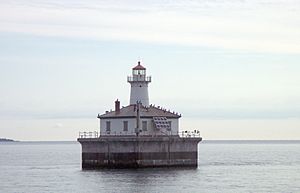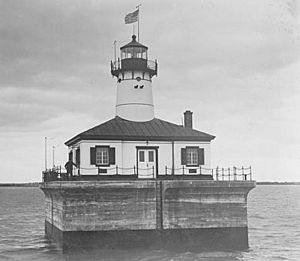Fourteen Foot Shoal Light facts for kids
 |
|
| The light in 2001 (note the solar panels that provide the current power) | |
| Location | Lake Huron, Michigan |
|---|---|
| Coordinates | 45°40′47.3″N 84°26′6″W / 45.679806°N 84.43500°W |
| Year first constructed | 1929 |
| Year first lit | 1930 |
| Automated | 1930 |
| Foundation | Concrete Crib |
| Construction | Reinforced concrete and steel |
| Tower shape | square building; frustum of a cone tower |
| Markings / pattern | White with red trim |
| Height | 36 feet (11 m) |
| Focal height | 55 feet (17 m) |
| Original lens | Fourth-order Fresnel lens (original), 9.8-inch (250 mm) Tidelands acrylic optic Fresnel lens (current) |
| Range | 9 nautical miles (17 km; 10 mi) |
| Characteristic | Occulting W 4 seconds
Operates year round. |
| Fog signal | HORN: 1 blast ev 15 s (2s bl) Diaphone |
The Fourteen Foot Shoal Light is a special lighthouse in Lake Huron, Michigan. It helps guide boats safely through a tricky part of the lake. It got its name because the water here is only about 14 feet (4.3 meters) deep. This shallow area, called a shoal, can be dangerous for ships.
This lighthouse is located at the northern end of Lake Huron. It's important for boats traveling to places like Chicago. They need to pass through a narrow channel while avoiding shallow spots. The Fourteen Foot Shoal Light marks the southern side of this safe channel, working with the Poe Reef Light which marks the northern side.
Contents
History of the Lighthouse
The United States Lighthouse Service planned for this lighthouse to be controlled automatically from the start. This was quite new for its time! It was designed to be operated by radio from the nearby Poe Reef Light, which is about 3.5 miles (5.6 km) away. This meant no one needed to live at the lighthouse.
Work on the permanent lighthouse began in 1929. Before that, a temporary light buoy was used starting in 1925. The Fourteen Foot Shoal Light officially began working in 1930.
Light and Sound Signals
The original light used a special lens called a fourth-order Fresnel lens. This type of lens helps make the light beam very strong and visible from far away. The light's main beam shines from about 56 feet (17 meters) above the water.
Today, the lighthouse uses a modern acrylic Fresnel lens. This lens can be seen from up to 9 nautical miles (17 km) away. The lighthouse also has a diaphone fog horn. This horn makes a loud sound to warn boats when it's foggy and they can't see the light.
Current Status and Visiting the Light
The Fourteen Foot Shoal Light is still an active aid to navigation. This means it continues to help guide boats safely on the water. The United States Coast Guard takes care of it.
In 2002, the crew of the ship USCGC Mackinaw helped paint and fix up the lighthouse. It's important to keep these historic lights in good shape.
Historic Recognition
The lighthouse has been added to the National Register of Historic Places. This is a list of places in the United States that are important to history. It helps protect and recognize special buildings and sites.
How to See the Lighthouse
The best way to see the Fourteen Foot Shoal Light up close is by private boat. However, there are other ways to get a good view!
- Boat Tours: Some companies, like Nautical North Family Adventures and Shepler's Ferry Service, offer boat tours that pass by the lighthouse. These tours often share interesting facts about the lighthouses and the area.
- Distant Views: You can also see the lighthouse from a distance. Good spots for this include the Cheboygan Crib Light and Cheboygan State Park.
New Ownership
In 2012, the National Park Service offered the lighthouse for new ownership. This was done under a special law called the National Historic Lighthouse Preservation Act. This law helps make sure historic lighthouses are cared for.
In 2017, the lighthouse was officially transferred to the Lake Huron Lighthouse Preservation Society Inc. This is a non-profit group in Michigan that works to protect lighthouses.
 | Selma Burke |
 | Pauline Powell Burns |
 | Frederick J. Brown |
 | Robert Blackburn |


